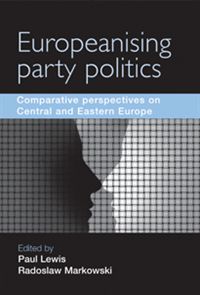Europeanising party politics - Comparative perspectives on Central and Eastern Europe
Paul G. LEWIS, Radoslaw MARKOWSKI
Availability:
- Categories: Political Parties and European Elections
- Publisher: MANCHESTER UNIVERSITY PRESS
- ISBN: 9780719082979
- Publication Date: 06/05/2011
- Binding: Hardback
- Number of pages: 256
Summary
The book is a comparative, empirically-based study of party politics in contemporary Central and Eastern Europe that seeks to define the impact of European Union membership in this area. The question of Europeanisation has been intensively debated over recent years, but no firm conclusion has been reached. This collection of rigorously comparative contributions directs attention to a number of key areas in the attempt to isolate cases where Europe has made a difference.
Successive chapters examine how new parties are managed by the state and the ways in which parties colonise the state itself, the role of transnational cooperation and the influence pan-European parties have on national organisations. The book goes on to consider patterns of party-oriented participation in the new democracies and dimensions of electoral turnout, dimensions of inter-party competition and identification of the specific features of post-communist party politics, examination of the key case of the extreme right and the conditions under which it tends to emerge, detailed analysis of the quality of political representation in the new democratic context, and discussion of how EU constraints are likely to undermine the prospects of stable party linkages. A conclusion seeks to establish how far Europe and EU policy has succeeded in influencing Central and East European developments.
Table of contents
1. Introduction: Europeanising party politics? Central and Eastern Europe after EU enlargement, by Paul G. Lewis
2. Party management and state colonisation in post-communist Europe: the European dimension, by Petr Kopecký and Maria Spirova
3. Political parties and their consolidation in post-communist new democracies: indirect and direct impacts from EU enlargement, by Geoffrey Pridham
4. Changing patterns of political participation, by Mitja Hafner-Fink, Danica Fink-Hafner and Alenka Krašovec
5. Voter turnout and electoral success of pro-European parties in post communist Europe, by Mikołaj Cześnik
6. Patterns of party competition, by Zsolt Enyedi and Fernando Casal Bértoa
7. The radical right in post-communist Europe: comparative perspectives on party competition, by Lenka Bustikova and Herbert Kitschelt
8. The quality of social, partisan and governmental representation, by Radoslaw Markowski and Zsolt Enyedi
9. (Shallow) Europeanisation and party system instability in post communist states: how changing constraints undermine the development of stable partisan linkages, by Robert Ladrech
10. Conclusion, by Radoslaw Markowski
